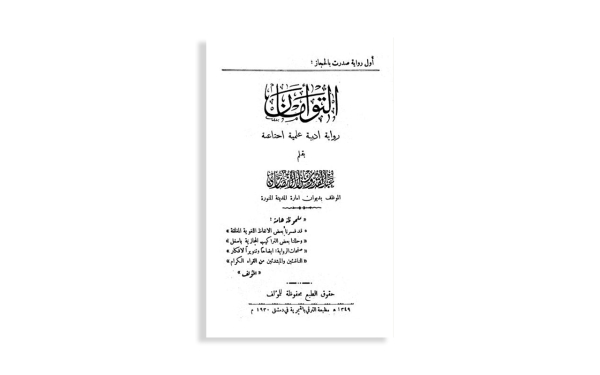
The Twins (al-Taw'aman) Novel is considered the first Saudi novel by the author Abdul Quddus al-Ansari. It was printed in 1930 at al-Tarqi Press in Damascus, and critics agree that it was the very first seed of this literary art in the Kingdom of Saudi Arabia. On the first page, the writer noted that it is "the first novel in Hejaz," from which modern Saudi literature later emerged.
The first birth of Saudi novel
Critics have agreed to designate the year of the birth of The Twins Novel in Saudi Arabia as the "labor pains" year of the Saudi novel, noting that it did not reach the desired artistic maturity. Others preferred to describe it as "the first attempts," while some even characterized the novels of that period as reformist educational novels. Moreover, early literary critical studies of this novel and its contemporaries have focused solely on historical studies.
Story of The Twins Novel
The story of The Twins Novel revolves around the idea of "the negative impact of foreign education," which led critics to view the novel as a socio-reformist work. It centers on the twin brothers, Rashid and Farid, who completed the preparatory stage of their education. After graduation, Rashid joined the national local school, while Farid opted for the foreign school, prompting the novel to depict the social and educational differences between the two schools and their effects on the brothers' characters.
The two schools instilled different intellectual orientations in the protagonists and influenced their social behavior; they demonstrated the significant success achieved by Rashid after enrolling in national schools and his subsequent career advancement, while Farid’s life ended in loss and dispersion in foreign countries, culminating in a tragic end.
The text of the novel is direct and tends toward guidance and admonition, yet it also presents important social and intellectual positions. It is considered to have achieved the purpose for which it was written, carrying the slogan of the eternal struggle between the idea of Arabism and the West. The author, Abdul Quddus al-Ansari, sought to highlight the "negatives caused by foreign institutes established in Arab countries."
Rashid promoted from one position and rank to another, achieving successive successes by choosing to study in national institutes rather than in foreign ones, eventually reaching the rank of "Basha al-Fakhama," conferred by a Royal Decree, while Farid’s life ended when he was killed in a bar in Paris.
The writer based his work on the idea of an absolute defense of Arab and Islamic civilization in opposition to the direct assault on foreign civilization and its negative impact on those involved in it. He used the means of education as an example by creating various dialogues among the conflicting parties, including the teachers from both schools, to reveal their objectives and intentions.
This novel, by portraying the eastern-western conflict through education, is considered the first to deviate from the conventional context of Arabic novels addressing this theme; however, like its counterparts, it ultimately concludes with the notion that survival and success lie in return to the local culture.
Related quizzes
Related articles


